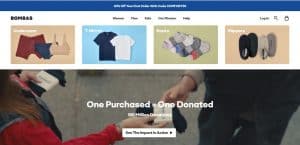Top 5 Shark Tank E-commerce Brands

Shark Tank is a reality television show where entrepreneurs pitch their business ideas to a panel of high-profile investors. The show has become a springboard for many small businesses and startups, with a few coming from the e-commerce sector.
With millions of viewers around the globe, Shark Tank has provided an unprecedented platform for entrepreneurs to showcase their products, gain investor backing, and most importantly, secure valuable exposure.
In this article, we’ll look at some of the best brands that already had established online stores before their appearance on Shark Tank and see what we can learn from them.
Shark Tank E-commerce Brands
#1 Bombas
| Product | Founder/Owner | Year Founded | Sales before Shark Tank | Current Value | Shark (investor) | Shark’s offer |
|---|---|---|---|---|---|---|
| High-quality socks and clothing with a one-for-one donation model | David Heath and Randy Goldberg | 2013 | $450,000 | Over $100 million | Daymond John | $200,000 for 17.5% equity |
#2 Scrub Daddy
| Product | Founder/Owner | Year Founded | Sales before Shark Tank | Current Value | Shark (investor) | Shark’s offer |
|---|---|---|---|---|---|---|
| Innovative,texture-changing household cleaning sponges | Aaron Krause | 2012 | $100,000 | Over $200 million | Lori Greiner | $200,000 for 20% equity |
#3 Squatty Potty
| Product | Founder/Owner | Year Founded | Sales before Shark Tank | Current Value | Shark (investor) | Shark’s offer |
|---|---|---|---|---|---|---|
| Toilet stool designed for easier and healthier bowel movements | Robert Edwards and Judy Edwards | 2011 | $1 million | Over $30 million | Lori Greiner | $350,000 for 10% equity |
#4 The Comfy
| Product | Founder/Owner | Year Founded | Sales before Shark Tank | Current Value | Shark (investor) | Shark’s offer |
|---|---|---|---|---|---|---|
| A combination of a blanket and a large hooded sweatshirt | Brian Speciale and Michael Speciale | 2017 | $0 (Product was a prototype at the time of the pitch) | Over $150 million | Barbara Corcoran | $50,000 for 30% equity |
#5 Tipsy Elves
| Product | Founder/Owner | Year Founded | Sales before Shark Tank | Current Value | Shark (investor) | Shark’s offer |
|---|---|---|---|---|---|---|
| Fun, quirky holiday-themed clothing | Evan Mendelsohn and Nick Morton | 2011 | $900,000 | Over $70 million | Robert Herjavec | $100,000 for 10% equity |
How Sharks Choose Their Investments
The process of securing investment on Shark Tank is a high-stakes pitch session where entrepreneurs present their business ideas to the panel of sharks.
The entrepreneurs are required to provide a clear and concise description of their product or service, their business model, their financial history and forecasts, and most importantly, their proposal for investment.
The sharks consider a wide array of factors before deciding to invest in a business. These include:
- Product or Service. The product or service must be unique, innovative, and capable of filling a gap in the market. The sharks are looking for products that have the potential to disrupt industries and become market leaders.
- Entrepreneur. The sharks invest in the person as much as the product. They look for entrepreneurs who are passionate, knowledgeable, and capable of driving the business to success.
- Business Model. A solid business model is crucial. The sharks need to understand how the business makes money and how it can scale.
- Financials. The sharks scrutinize the company's financial history, including sales, profits, costs, and growth rates. They also consider the valuation of the company and the equity stake on offer.
- Market Potential. The potential market size and the ability to penetrate that market are critical factors. The sharks want to see that there is a significant potential customer base and that the company has a viable strategy to reach that base.
Lessons for E-commerce Sellers
Understanding the strategies and principles that have driven Shark Tank brands to success can provide invaluable lessons for e-commerce sellers. Here are insights drawn from the top five Shark Tank e-commerce brands:
- Know your customer. Successful brands have a deep understanding of their target customer's needs, preferences, and buying behavior. They use this knowledge to tailor their products, marketing strategies, and customer service.
- Innovate continually. Brands that succeed post-Shark Tank never rest on their laurels. They continually innovate, whether by adding new features to their products, expanding their product lines, or finding novel ways to engage with customers.
- Leverage social media. Effective use of social media is a common trait among successful Shark Tank brands. They utilize various platforms to create awareness, engage with customers, and drive traffic to their online stores.
Tips and Strategies
Building on these insights, here are some practical tips and strategies for aspiring e-commerce entrepreneurs:
- Solve a problem. Think of a product or service that offers real value to your target market. It doesn’t have to be revolutionary, but it must offer something that isn’t currently available in the market. Remember that a business thrives because it provides customers a solution to their problem.
- Understand your market. Conduct thorough market research to understand your customers and competitors. Use this information to refine your product, pricing, and marketing strategies.
- Invest in a user-friendly website. Your website is your online storefront. Make sure it's easy to navigate, visually appealing, and optimized for mobile devices.
Also read: How to Start your Own E-Commerce Store
Conclusion
It's clear that Shark Tank can serve as a powerful launchpad for e-commerce brands, providing not just capital but also invaluable exposure and validation. The brands mentioned in this article have leveraged the platform to catapult their businesses, attaining significant success in their respective markets.
They all share characteristics of innovation, compelling storytelling, and a strong focus on customer needs. Their journeys provide invaluable lessons for aspiring e-commerce entrepreneurs.








